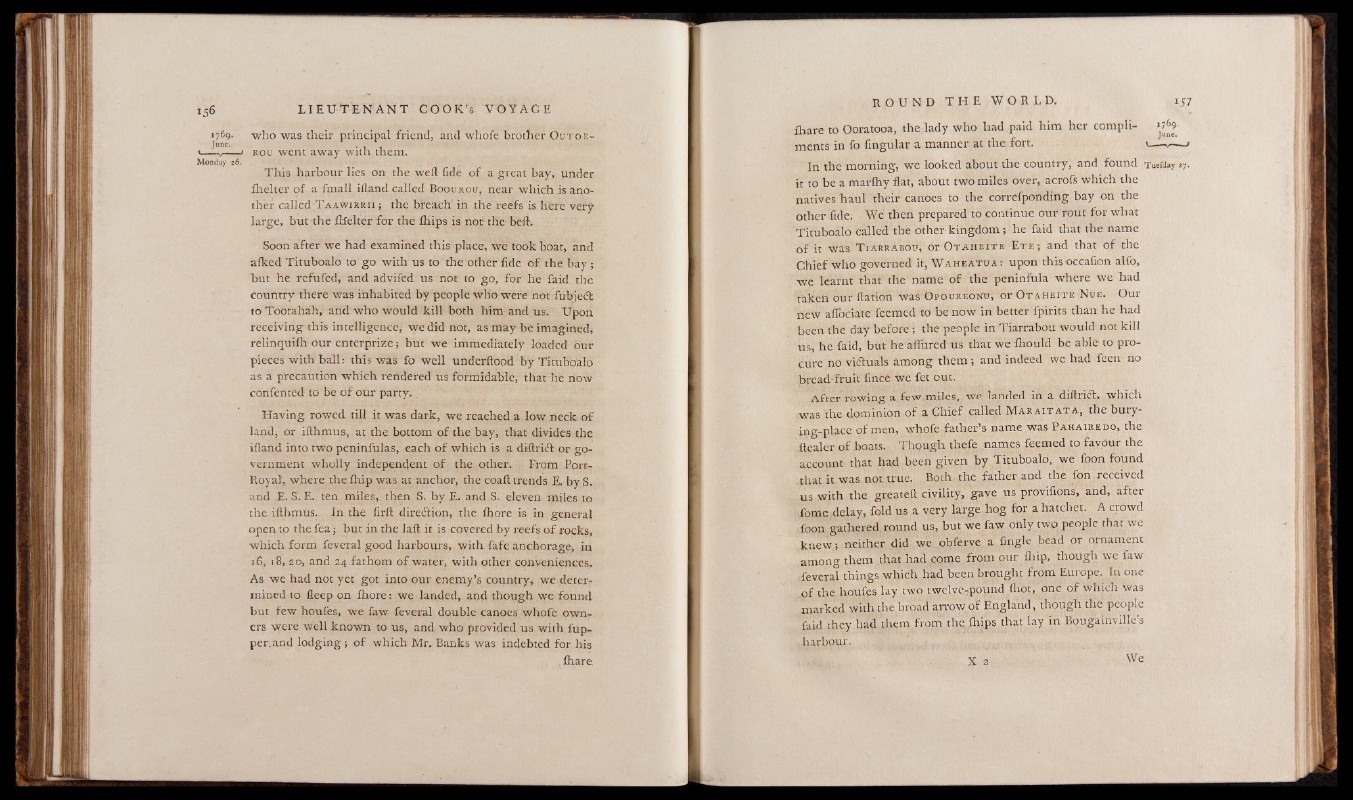
1769.
June.
Monday 26.
who was their principal friend, and whofe brother Outor-
rou went away with them.
This harbour lies on the weft fide of a great bay, under
fhelter of a fmall ifland called Boourou, near which is another
called T aawirrii ; the breach in the reefs is here very-
large, but the fhelter for the fhips is not the beft.
Soon after we had examined this place, we took boat, and
afked Tituboalo to go with us to the other fide of the ba y;
but he refufed, and advifed us not to go, for he faid the
country there was inhabited by people who were not fubjedt
to Tootahah, and who would kill both him and us. Upon
receiving this intelligence* we did not, as may be imagined*
relinquilh our enterprize; but we immediately loaded our
pieces with ball: this was fo well underftood by Tituboalo
as a precaution which rendered us formidable, that he now
confented to be of our party.
Having rowed till it was dark, we reached a low neck of
land, or ifthmus, at the bottom of the bay, that divides the
ifland into two peninfulas, each of which is a diftridt or government
wholly independent of the other. From Port-
Royal, where the fhip was at anchor, the coaft trends E. by S.
and E. S.E. ten miles, then S. by E. and S. eleven miles to
the ifthmus. In the firft direction, the fhore is in general
open to the fea; but in the laft it is covered by reefs of rocks,
which form feyeral good harbours, with fafe anchorage, in
16, 18, 20, and 24 fathom of water, with other conveniences.
As we had not yet got into our enemy’s country, we determined
to fleep on fhore: we landed, and though we found
but few houfes, we faw feveral double canoes whofe owners
were well known to us, and who provided us with fup-
per:and lodging; of which Mr. Banks was indebted for his
fhare.
fhare to Ooratooa, the lady who had paid him her compli- ' l a ments
in fo fingular a manner at the fort. i---- -—
In the morning, we looked about the country, and found Tuefday 27.
it to be a marfhy flat, about two miles over, acrofs which the
natives haul their canoes to the correfponding bay on the
other fide. We then prepared to continue our rout for what
Tituboalo called the other kingdom ; he faid that the name
o f it was T iarrabou, or Otaheite Ete ; and that of the
Chief who governed it, Wahe a tua : upon this occafion alfo,
we learnt that the name of the peninfula where we had
taken our ftation was Opoureonw, or Otaheite Nue. Our
new affociate feemed to be now in better fpirits than he had
been the day before ; the people in Tiarrabou would not kill
us, he faid, but he allured us that we fhould be able to procure
no victuals among them ; and indeed we had feen no
bread-fruit fince we fet out.
After rowing a few miles, we landed in a diftricl, which
was the dominion.of a Chief called Mar ait at a , the bury-
ing-place of men, whofe father’s name was Pahairedo, the
Healer of boats. Though thefe names feemed to favour the
account that had been given by Tituboalo, we foon found
that it was not true. Both the,father and the fon received
us with the greateft civility, gave us provifions, and, after
ibrne delay, fold us a very large hog for a hatchet. A crowd
foon gathered, round us, .but we faw only two people that we
knew; neither did we. obferve a fingle bead or ornament
among them that had come from our fliip, though we faw
feveral things which had been brought from Europe, In one
of the houfes lay two twelve-pound fhot, one o f which was
marked with the broad arrow of England, though the people
faid they had them from the.Ihips that lay in Bougainville’s
harbour.
X 3 ' We